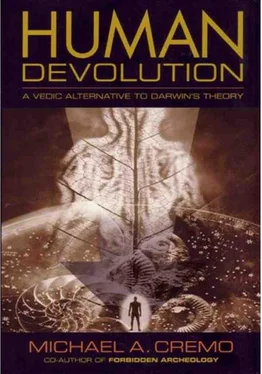Michael Cremo - Human Devolution - A Vedic Alternative To Darwin's Theory
Здесь есть возможность читать онлайн «Michael Cremo - Human Devolution - A Vedic Alternative To Darwin's Theory» весь текст электронной книги совершенно бесплатно (целиком полную версию без сокращений). В некоторых случаях можно слушать аудио, скачать через торрент в формате fb2 и присутствует краткое содержание. Год выпуска: 2003, ISBN: 2003, Издательство: Torchlight Publishing, Жанр: Старинная литература, на английском языке. Описание произведения, (предисловие) а так же отзывы посетителей доступны на портале библиотеки ЛибКат.
- Название:Human Devolution: A Vedic Alternative To Darwin's Theory
- Автор:
- Издательство:Torchlight Publishing
- Жанр:
- Год:2003
- ISBN:9780892133345
- Рейтинг книги:4 / 5. Голосов: 1
-
Избранное:Добавить в избранное
- Отзывы:
-
Ваша оценка:
- 80
- 1
- 2
- 3
- 4
- 5
Human Devolution: A Vedic Alternative To Darwin's Theory: краткое содержание, описание и аннотация
Предлагаем к чтению аннотацию, описание, краткое содержание или предисловие (зависит от того, что написал сам автор книги «Human Devolution: A Vedic Alternative To Darwin's Theory»). Если вы не нашли необходимую информацию о книге — напишите в комментариях, мы постараемся отыскать её.
Human Devolution: A Vedic Alternative To Darwin's Theory — читать онлайн бесплатно полную книгу (весь текст) целиком
Ниже представлен текст книги, разбитый по страницам. Система сохранения места последней прочитанной страницы, позволяет с удобством читать онлайн бесплатно книгу «Human Devolution: A Vedic Alternative To Darwin's Theory», без необходимости каждый раз заново искать на чём Вы остановились. Поставьте закладку, и сможете в любой момент перейти на страницу, на которой закончили чтение.
Интервал:
Закладка:
Chauncey Hare Townshend (1853) gave the following account of Adolphe’s clairvoyance. Adolphe came to Townshend’s room at the Hôtel de l’Ecu at Geneva. Townshend put Adolphe into trance and then asked: “can you see a person whom I know at Lausanne?” He deliberately did not tell the sex of the person. Adolphe, answered, “I shall be able; but you must first lead me to Lausanne by your thoughts.” He paused and then continued, “I embark on the steamer. I go up the Lake. The vessel stops at various places. I am now opposite a small town.” According to Townshend, this would have been Ouchy. Adolphe, who, according to Townshend had never been to Lausanne, continued, “I get into a boat. I land. I walk up a broad road, up hill. now I turn to the right. now I see a house to my right. The house stands in a sort of angle, between two smaller roads than the one by which i first came . It is very near the road. I go up steps to the door. I enter a not large vestibule; from this I go into a salon. There is a door open in the salon, which connects it with another room. The two rooms seem to me almost like one large apartment that stretches quite from one end of the house to the other.”
“And where is the person who lives in the house?” Townshend asked. “Wait, wait,” said Adolphe. “There is no one in the salon. I go up stairs. I see a woman.” Townshend asked him to describe her, and Adolphe proceeded to give “a very accurate description” of Townshend’s cousin. Townshend noted, “The features, the hair, way of wearing it, etc., were all correct.” Adolphe then commented that the woman was wearing something funny on her head. Townshend thought he might be referring to a particular hat his cousin was accustomed to wear when she went horseback riding. But Adolphe insisted it was a “brown net.” Townshend thought him mistaken. Adophe continued, exclaiming: “What an odd dress this lady wears! She has the upper and lower part of her dress quite unlike! The upper part is more like a man’s—a sort of jacket; then there are skirts of quite another material.” Townshend again thought him incorrect. Adolphe then said, “She goes to the window. She looks out anxiously. She is doubting about the weather: ah! she is wishing to go out on horseback. Riding horses is her current passion.” Townshend noted: “Here I was indeed struck; for nothing could be more true than this assertion.”
Adolphe, feeling somewhat fatigued, asked Townshend to refresh him with some mesmeric passes. He then continued speaking, “I am at a point of time anterior to that of which we were just now speaking. I see the same lady in another room—in another house. What I see happened before you left Lausanne for Geneva. She sits in a large arm-chair by the fire. You are sitting on another chair ( not an arm-chair) facing her. You are telling her about your going to Geneva; you seem interested; you lean forward in your chair. I see you both perfectly!” According to Townshend, this description was correct in every detail. He especially noted that his cousin’s visit to him in Lausanne was accidental: “In passing, she had seen my carriage at the door—had entered to ask where I was going, and had been seated exactly as described while I was speaking of my going to Geneva.”
The séance had been witnessed by a Mr. Lawrence. After Adolphe left, Townshend and Lawrence discussed what had happened. Townshend, after telling Lawrence that most of Adolphe’s statements were true, added, “I think Adolphe was wrong on some points; namely, about the being able to see from one end of the house to the other, about the brown net and the dress, possibly even about my cousin riding out at all today, for I believe it is not her day for going to the riding-school.” On returning to Lausanne, Townshend related the details of the séance to his cousin, including Adolphe’s mistakes. Townshend was surprised to hear his cousin say, “But he was not wrong. The day you left Lausanne, I opened the door between my two rooms, to let in the warmth from the stove in the dining room, and so they have remained ever since.”
“But, he was wrong about the brown net?” asked Townshend. “not so! I was putting on a brown net to keep my hair up: I will show it you. I did not wear my wide-awake [hat] that day. Moreover, though not my regular day for riding, I went to take a lesson, because the days had just been changed. I also had put on only my jacket, but had my usual dress below it.” Townshend asked what time this had taken place. “Between 11 and 12,” replied his cousin. That was the exact time that Townshend had been with Adolphe in Geneva.
Bhaktivinoda thakura and Bishkishin
Bhaktivinoda Thakura (1838–1914) was a prominent figure in the religious history of the Gaudiya vaishnava sect of India. He was one of the predecessors of my own spiritual master, His divine Grace A. c. Bhaktivedanta Swami Prabhupada. during much of his adult life, Bhaktivinoda Thakura worked with the British government of India as a magistrate. Before he adopted the honorific spiritual title Bhaktivinoda Thakura, he was known by his birth name Kedarnatha dutt. In 1870, he was appointed deputy magistrate and collector at the holy town of Puri in the state of Orissa, working under the British commissioner, T. E. Ravenshaw. In 1872, Ravenshaw assigned Bhaktivinoda Thakura to put down a disturbance led by Bishkishin, a leader of the deviant Atibari sect (Macnaughton 1989, p. 110).
Bishkishin, a yogi who displayed some mystic powers, claimed to be an incarnation of Maha vishnu. In the vedic cosmology, Maha vishnu, an expansion of the Supreme Godhead, lies in the causal Ocean and is the source of numberless material universes, which emerge from His breathing. In essence Bishkishin was claiming to be God. To impress people, he performed many miracles indicating he possessed paranormal powers. Macnaughton, relying on a variety of biographical and autobiographical sources, wrote (1989, p. 112): “He would sit erect in front of a fire and lean into the flames for some time and then return to an erect position without injury. He could read people’s minds, instantly cure diseased persons and manifest fire from his head.” He also announced that soon he would, as God Himself, kill all the Europeans, thus delivering India from their control.
Bhaktivinoda Thakura went with the district superintendent, the local chief of police, and some constables to confront Bishkishin, who was staying in the jungle near the village of Sharadaipur. Bhaktivinoda Thakura, leaving the constables hiding in the jungle, went forward and found Bishkishin with a crowd of admiring people. Seeing him, Bishkishin inquired, “I know that you are a Bengali and a Magistrate. Why have you come here on this dark night?” Bhaktivinoda Thakura said, “I have come to see you.” Bishkishin replied, “That being the case, please sit down and hear my teachings. I am Maha visnu. Arising from the ocean of milk, I have come to this place, and very soon I will destroy all the Europeans, including the King of England.” Bishkishin then began to reveal everything about Bhaktivinoda Thakura, including his name and his purpose in coming. Macnaughton (1989, p. 114) stated, “The yogi , in order to impress the Thakura with his power, then called before him many people with incurable diseases, and in a moment made them well. One person was suffering with a spear wound. The yogi brought him under his control and produced some ashes which he smeared on the wound. Immediately the wounded man was well and free of pain.”
After conducting further investigations in the surrounding villages, Bhaktivinoda Thakura returned later with one hundred red-turbaned police armed with rifles. Bishkishin asked, “What is the meaning of all this?” Bhaktivinoda Thakura said, “They have come to take you. It is the Governor’s order that you should be brought to Puri.” Bishkishin retorted, “Who is this Governor? I am king, for I am the Supreme Godhead and master of all the universes. I bow down before no one. Let us see who is able to take me away from this place!” (Macnaughton 1989, p. 115) Bhaktivinoda Thakura replied (Macnaughton 1989, p. 116), “If you do not go peacefully, we will be obliged to take you away by force.” Becoming angry, Bishkishin challenged, “I order you to immediately leave this place! Let us see who has the power to take me!”
Читать дальшеИнтервал:
Закладка:
Похожие книги на «Human Devolution: A Vedic Alternative To Darwin's Theory»
Представляем Вашему вниманию похожие книги на «Human Devolution: A Vedic Alternative To Darwin's Theory» списком для выбора. Мы отобрали схожую по названию и смыслу литературу в надежде предоставить читателям больше вариантов отыскать новые, интересные, ещё непрочитанные произведения.
Обсуждение, отзывы о книге «Human Devolution: A Vedic Alternative To Darwin's Theory» и просто собственные мнения читателей. Оставьте ваши комментарии, напишите, что Вы думаете о произведении, его смысле или главных героях. Укажите что конкретно понравилось, а что нет, и почему Вы так считаете.












